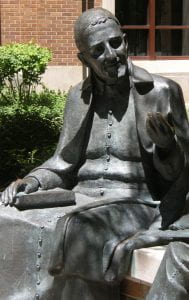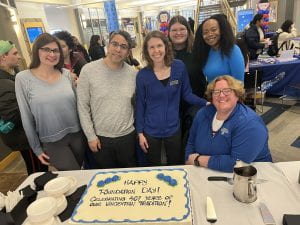 This week and every year on January 25, the Congregation of the Mission celebrates Foundation Day.
This week and every year on January 25, the Congregation of the Mission celebrates Foundation Day.
In my heart, our foundational story never grows old. In celebrations of this type, something stirs within me. I feel connected to our origins. I feel inspired to recalibrate my existence and set out for new adventures in serving others, especially those living in poverty and exclusion, and investing my best energy in the structural transformation of our many realities.
Saint Vincent always considered 1617 as the birthday of the mission. Even though his three principal foundations had distinct juridical birthdates—the Confraternities of Charity in 1617, the Congregation of the Mission in 1625, and the Daughters of Charity in 1633, Vincent consistently looked back at 1617 as the year when everything began. On that year, he had two powerful experiences, one in Folleville and the other in Châtillon. These became two life-changing experiences for him. It was on January 25, 1617, in Folleville where he preached a powerful and inspiring sermon about general confession. Vincent himself referred to this as the first sermon of the mission. Later that year in Châtillon, he passionately invited the community to support a poor family through acts of compassion and charity. Vincent witnessed the impact of his words in a solidarity chain (organized charity) that he helped to create to support this family fully recover from their many struggles.
Vincent de Paul was fired by passion to meet the integral (spiritual and material) needs of persons who were poor. With a talent for organizing others who shared his passion, in 1625 he began a group of priests and brothers, the Congregation of the Mission, for the integral attention to the poor and the formation of the clergy.
The original intuition of St Vincent de Paul is underway at DePaul University today
The identity of the Congregation of the Mission has evolved and adapted to different geographical and historic realities. It was in this process of constant evolution that the Congregation founded DePaul University in 1898, and therefore, this year we celebrate 125 years of our institutional foundation. DePaul’s history and identity are naturally and deeply linked to the values and convictions and even to the historic flaws of the Congregation of the Mission.
Our collective Vincentian mission and all the institutions grounded in it are not immobile and finished realities. They are projects that are open to the signs of the times and to the realities and challenges of the places where they are located. They are constantly transformed to become more credible and coherent, to keep alive the original spiritual intuition in the heart of Vincent de Paul, and thus to be a real contributor to the systemic change of our world today. DePaul will accomplish this change by supporting our students’ integral development so that they themselves can become agents of social transformation.[1]
Designing DePaul
Our new strategic planning process, Designing DePaul, begins this week on Thursday, January 26. This process takes place at a time when it seems that the fruit that needs to be gestated may be greater than our abilities to fully commit ourselves to the challenges of reality, to understand history, and to recreate ourselves, our structures, and our workplaces with courage. There are so many things that distract us, paralyze us, and disturb us. DePaul University is today like fragile clay in the hands of all who, loving it, are open to invest the best of their energy, ideas, and passion to envision its own recreation. This must become a time to honor and re-envision the legacy that has shaped where we are today and a time to find new ways to live our call to service (social and environmental justice), community (common good) and spirituality (connection and collaboration at all levels for a greater good).
The decisive thing for us is always to recreate our identity in the daily work and commitment of the Mission given the needs of the reality before us. The reinterpretation of our identity and mission, the new systemic and structural emphasis, the new focal points of attention, and the new curricular and pedagogical approaches must be done from the cultural and structural context of our time and at the heart of the transformation that Pope Francis has proposed to all Catholic Institutions.
I hope that Designing DePaul will be a great opportunity to redefine our most basic connections around our common mission and to heal our institutional fabric wherever and at any level in which it may be broken. As President Manuel has said repeatedly, I hope that we will be bold enough to solve old structural problems and to achieve financial sustainability.
I hope that Designing DePaul will be an opportunity for us to collectively decide the meaning and institutional implication of our Catholic Identity in a multicultural, multi-faith and multi-convictional environment.
I hope that this new strategic plan will be the opportunity for DePaul University to finally advance in making the ecological leap and the ethical leap to commit our educational, structural and economic resources in a pedagogical and institutional model that is fully committed to the sustainability of life, with special emphasis on all forms of life that are most vulnerable, and to commit to the Common Good, to ensure the sustainability of our planet and our common human existence.
May the remarkable freedom and innovation of Vincent de Paul be a real source of inspiration during our strategic planning that reinforces in us the urgent sense of community we need to build in our midst, the profound spiritual connection within a community that celebrates and deeply honors its rich and vast diversity, and our pledge to equity and sustainability. At DePaul, we are committed to recognizing, respecting, and protecting the dignity of all so that everyone in our community, in their own individual identities, can say “I Am Somebody,” as the Rev. Jesse Jackson so famously said, without fear and without the risk of becoming a victim of any kind of violence.
Reflection Questions:
How are you planning to engage in Designing DePaul, our new strategic plan?
From your area of work and commitment, what do you think should be a couple of non-negotiables in DePaul’s new strategic plan?
Do not forget that the Office of the President is open to hear and to receive all your recommendations!
Reflection by: Fr. Guillermo Campuzano, C.M., Vice President of Mission and Ministry
[1] Cf. “University Mission Statement,” Division of Mission & Ministry, DePaul University, adopted March 4, 2021, https://offices.depaul.edu/mission-ministry/about/Pages/mission.aspx.
 On January 25 in celebration of Foundation Day, a new edition of The Shared Coin was released. This tradition is an invitation for all DePaul students, faculty and staff to celebrate individuals living DePaul’s Vincentian mission by sharing a coin with them. Along with the coin, givers are encouraged to personalize this experience by using the back of the card given out with each coin to write a message to the individual they are acknowledging.
On January 25 in celebration of Foundation Day, a new edition of The Shared Coin was released. This tradition is an invitation for all DePaul students, faculty and staff to celebrate individuals living DePaul’s Vincentian mission by sharing a coin with them. Along with the coin, givers are encouraged to personalize this experience by using the back of the card given out with each coin to write a message to the individual they are acknowledging. Everyone within the DePaul community is encouraged to integrate this tradition across campus, whether through weekly meetings, gatherings or one-on-one settings. Recipients often feel grateful for the recognition of their good work and their commitment to DePaul’s mission.
Everyone within the DePaul community is encouraged to integrate this tradition across campus, whether through weekly meetings, gatherings or one-on-one settings. Recipients often feel grateful for the recognition of their good work and their commitment to DePaul’s mission. 

